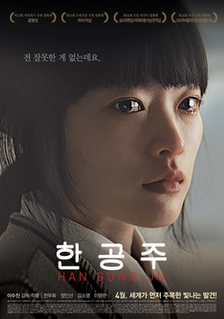| 2nd Wildflower Film Awards | |
|---|---|
| Date | April 9, 2015 |
| Site | Literature House, Seoul |
The 2nd Wildflower Film Awards (Hangul : 들꽃영화상) is an awards ceremony recognizing the achievements of Korean independent and low-budget films. It was held at the Literature House in Seoul on April 9, 2015. [1] [2] [3] The selection committee was composed of 25 film professionals and regular audience members who met often to view and discuss new releases; their nomination list was further narrowed in the final voting stage by invited critics and programmers. 21 films were nominated across 10 categories from a pool of 60 narrative films and 30 documentaries, each with a budget under ₩1 billion (US$900,000) and released theatrically between January 1 and December 31, 2014. [4] [5]
The Wildflower Film Awards (Hangul: 들꽃영화상) is an awards ceremony recognizing the achievements of Korean independent and low-budget films. The awards, presented by the Wildflower Film Awards Korea - a grassroots effort by a group of film critics led by founder and organizer Darcy Paquet, aims to create more publicity in Korea and abroad for filmmakers working outside of the mainstream commercial film industry. Awards are handed out annually to films released in the previous year.

The Korean alphabet, known as Hangul, has been used to write the Korean language since its creation in the 15th century by King Sejong the Great. It may also be written as Hangeul following the standard Romanization.
An independent film, independent movie, indie film or indie movie, is a feature film or short film that is produced outside the major film studio system, in addition to being produced and distributed by independent entertainment companies. Independent films are sometimes distinguishable by their content and style and the way in which the filmmakers' personal artistic vision is realized. Usually, but not always, independent films are made with considerably lower budgets than major studio films.
Contents
The nine categories from the inaugural ceremony were expanded to ten this year. An overall Grand Prize (Daesang) and Best Screenplay were added, Best Director was divided into narrative films and documentaries, and Best New Actor or Actress was divided into two according to gender. Founder and event director Darcy Paquet said, "Starting from the 2nd award ceremony onwards, we plan to keep this format." [6]
There were ten awards in total: the Grand Prize, Best Director - Narrative Films, Best Director - Documentaries, Best Actor, Best Actress, Best New Director, Best New Actor, Best New Actress, Best Screenplay, and Best Cinematography. [7] The Grand Prize was chosen among the 14 nominees for Best Director - Narrative Films and Best Director - Documentaries. Prizewinners each received a specially designed ceramic trophy from Konkuk University professor Harin Lee, a well-known figure in Korea's ceramic arts community. [8]

Konkuk University is one of the leading private universities located in Seoul and Chungju. The Seoul campus is located in the southeastern part of Seoul, near the Han River, and is served by a metro station of the same name. The Seoul campus has 11 undergraduate colleges and 13 graduate schools, whereas the GLOCAL campus in Chungju is composed of four undergraduate colleges and four graduate schools. As of 2018, 29,600 undergraduate and graduate students were enrolled in the university, which has more than 3,000 faculty and staff.
In addition to the ceremony, six of the nominated films were screened in the three days leading up to the awards (April 6-8) at the Seoul Theater, along with Q&A sessions with the nominated directors and actors. The first volume of bilingual book Wildflower Film Awards Annual was also published, featuring essays and interviews on 11 independent Korean films, each accompanied by specially commissioned illustrations by local artists. [8]








